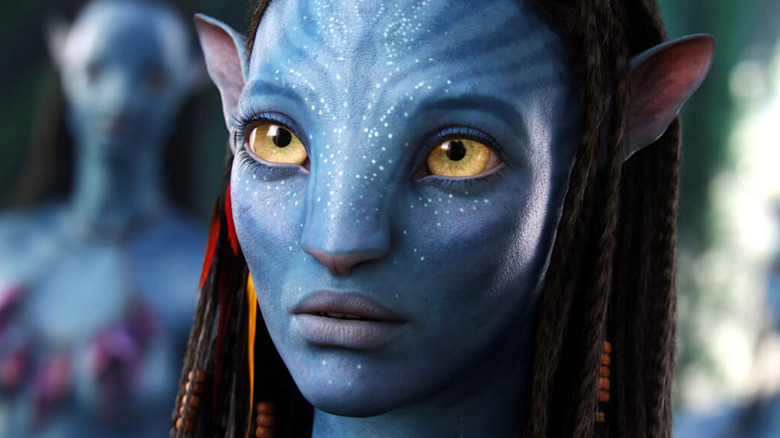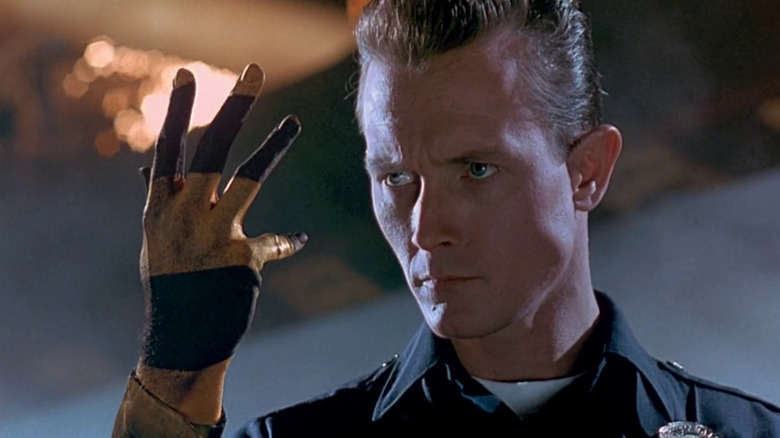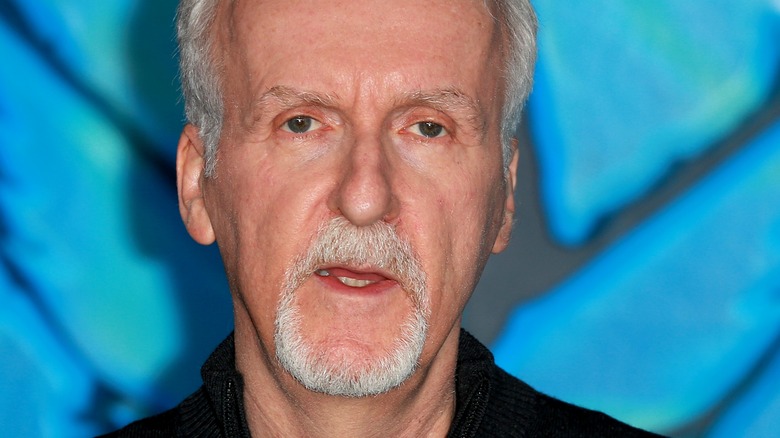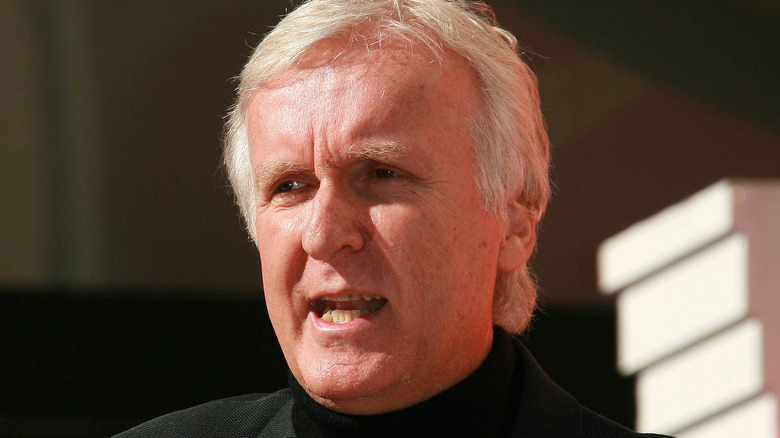Here's Why Avatar: The Way Of Water Proves James Cameron Is The GOAT
His friends call him Jim, but the rest of the world knows him as James Cameron, the director of classics such as "Terminator," "Titanic," "Avatar," and "Piranha II: The Spawning." But is he one of the best to ever do it? That's a loaded question to which there is no correct answer. At the same time, Cameron deserves to be in the conversation when it comes to trying to determine who is the greatest filmmaker of all time.
James Cameron's movies have received plenty of positive feedback and made some serious bank at the box office. That said, many filmmakers out there enjoy considerable acclaim and success but aren't regarded by opinionated movie connoisseurs as the crème de la crème of their craft. What makes Cameron different?
Cameron has ascended to the top of Hollywood by being an uncompromising visionary whose movies have entertained the masses and changed the landscape of filmmaking as a whole. "Avatar: The Way of Water" is his latest magnum opus to solidify his status as both an all-time great director and forward-thinking maestro. However, that shouldn't surprise anyone who's followed his almighty career until now.
James Cameron's career is synonymous with innovation
James Cameron doesn't let the limitations of technology stop him from bringing his ambitious visions to life. He's built a career on pioneering and advancing groundbreaking technology that's pushed the medium of cinema forward, defying odds and expectations in the process.
"The Abyss," saw Cameron experiment with CGI at a time when the notion seemed more alien than the Non-Terrestial Intelligence at the heart of the film's mystery. "Terminator 2: Judgment Day," meanwhile, paved the way for motion capture in cinema, in turn making the T-1000 cinema's first fully CGI character (via The Guardian). When 3D technology didn't meet his demands for "Avatar," Cameron and Vince Pace developed the Fusion camera system and took stereoscopic filmmaking to the next level. Per CNET, "Avatar" also created the first "virtual production stage," which allows filmmakers to see characters in their CGI environments in real-time.
Unsurprisingly, "Avatar: The Way of Water" continues Cameron's propensity for innovation. According to GQ, the long-awaited sequel saw the director and his team build a new camera system using Sony's Venice cameras, which they used to create a 3D shooting rig. The effects will undoubtedly inform other filmmakers for years to come — or at least until "Avatar 3" raises the bar once again.
Spectacle never overshadows story
Technological prowess and game-changing filmmaking techniques are great and all, but James Cameron's movies would be soulless robots if that's all they offered. There is no denying that he's a director who understands the power of spectacle and showmanship, but never at the expense of telling a good story.
Despite his tough reputation, Cameron is an emotional storyteller who contemplates big ideas. Most of his movies are love stories, ranging from the romantic kind to familial ones. As such, it's easy to root for his characters and sympathize with their plights as they're being hunted down by cyborgs or shot at by soldiers. Furthermore, his movies are thematically rich and explore issues pertaining to the environment, technology, and the perils faced by humankind.
His latest adventure is no different. "Avatar: The Way of Water" is all about family sticking together through difficult times, which enables the action sequences to have more high-stakes drama and heartbreaking consequences. The sequel is perhaps Cameron's most damning critique of humanity mistreating the natural world too, as evidenced by all of the animal slaughter and hunting scenes. Climate change issues and humanity's abuse of the world's oceans are subjects that are close to Cameron's heart, and that message is more prominent than showcasing fancy special effects in "Avatar: The Way of Water."
James Cameron isn't interested in repeating himself
James Cameron is the king of sequels. From "Terminator 2" to "Aliens," the director is only interested in making follow-ups if he can bring new ideas to the table. Some filmmakers are content to rehash old concepts when it comes to sequels, but Cameron prefers taking things to the next level.
The first "Terminator" movie is a modest slasher compared to the sequel, which ups the ante in terms of scale, story, and technological achievements. With "Aliens," he created an action-horror masterpiece that replaces the haunted house-inspired dread of Ridley Scott's "Alien" with high-octane thrills and war movie elements. Cameron's sequels retain the essential DNA of their predecessors, while simultaneously striving to be bigger and better than them.
"Avatar: The Way of Water" continues this trend. As expected, the special effects are breathtaking and boundary-pushing. However, the movie also expands upon the rich world introduced in the 2009 film, introducing viewers to new tribes, locations, and characters. Pandora is a fully realized world that's inspired Cameron to keep making "Avatar" sequels for the foreseeable future, and it's clear that he has a long-term vision for the franchise. One thing is for sure: no "Avatar" sequel will be a lazy rehash of a previous film.
James Cameron gets what he wants
James Cameron has a reputation for being difficult to work with, but his methods have certainly produced big results. Prior to the release of "Avatar," he clashed with Fox studio executives who felt that the film was too long. However, as he told The New York Times, Cameron reminded those execs that he made "Titanic," the movie that paid for their studio lot and expensive offices. He eventually got his way, and "Avatar" became the highest-grossing movie of all time.
Cameron's battles with studios, coupled with his determination to advance technology, show that he isn't the type of filmmaker who's willing to take no for an answer. His unwavering dedication to his projects has resulted in some of the most successful, boundary-pushing motion pictures to ever grace the screen. Granted, Cameron has more sway than most filmmakers, but he's more than earned it.
The parody version of James Cameron on "South Park" said it best: "James Cameron doesn't do what James Cameron does for James Cameron. James Cameron does what James Cameron does because James Cameron is... James Cameron." And that's why he's been churning out classic after classic for four decades.




